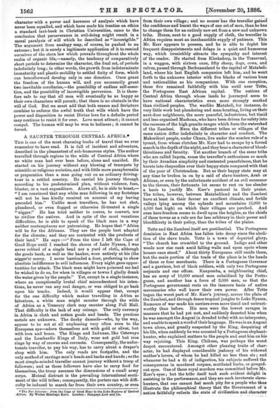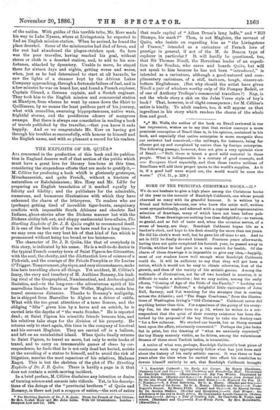A SAUNTER THROUGH CENTRAL AFRICA.• Tam is one of the
most charming books of travel that we ever remember to have read. It is full of incident and adventure, described in the pleasantest of sub-humorous styles. The author travelled through regions in the wilds of Central Africa where no white man had ever been before, alone and unaided. He started on his journey without any blowing of trumpets by scientific or religions societies, and with little more paraphernalia or preparation than a man going out on an ordinary driving- tour in a settled country. He carried his journey through according to his predetermined plan, without violence, fuss, bluster, or a vast expenditure. Above all, be is able to boast,— " I am convinced that any white man following in my footsteps will not be less kindly received on account of my having preceded him." Unlike most travellers, he has not shot, plundered, or even flogged or otherwise ill-treated a single " nigger." He has tried neither to coerce, to convert, nor to civilise the natives. And in spite of the most vexatious difficulties, he is able to speak of the black man in a way neither contemptuous nor patronising. He hopes that " Africa will be for the Africans. They are the people best adapted for the climate ; and they are contented with the products of their land." He says :—" From the time I left the Cape of Good Hope until I reached the shores of Lake Nyassa, I was never robbed of a single bead nor a yard of cloth, although the goods bank, as well as the banker, were entirely at his (the nigger's) mercy. I never barricaded a door, preferring to show absolute indifference to evil influences. Every night gave oppor- tunities for attack. The black man might have poisoned me had he wished to do so, for when in villages or towns I gladly drank the water given by the people." Yet, except in a single instance, where an exceptionally brutal chief misunderstood his inten- tions, he never ran any real danger, or was obliged to go back upon his tracks. Indeed, it would appear that, except for the one difficulty which makes travelling in Africa so laborious, a white man might saunter through the wilds of Africa as a Treasury clerk may saunter along Pall Mall. That difficulty is the lack of any coinage. The only currency in Africa is cloth and cotton goods and beads. The precious metals are unknown. The dusky damsels—who, by the way, appear to be not at all unpleasing very often even to the European eye—adorn themselves not with gold or silver, but with iron and brass. The Kings and Indunas, like Cetewayo and the Lombardia Kings of Italy, wear not gold but iron rings by way of crowns and coronets. Consequently, the unfor- tunate traveller, to pay his way, has to carry about a draper's shop with him. The only roads are footpaths, and the only method of carriage men's heads and backs and hands ; so the most simple-minded traveller cannot journey without a troop of followers ; and as these followers have also to carry food for themselves, the troop assumes the dimensions of a small army corps. Mutual distrust is the prevailing international senti- ment of the wild tribes ; consequently, the porters can with diffi- culty be induced to march far from their own country, or even • The Far Interior : from the Cape of Good Hope to the Lake Regions of Central Africa. By Walter Montages Kerr. London Sampson Low and Co. from their own village ; and no sooner has the traveller gained the confidence and learnt the ways of one set of men, than he has to change them for an entirely new set from a new and unknown tribe. Hence, next to a good supply of cloth, the traveller in Africa requires most an inexhaustible supply of patience. This Mr. Kerr appears to possess, and he is able to depict his frequent disappointments and delays in a quiet and humorous way, which irresistibly attracts the sympathy and interest of the reader. He started from Klerksdorp, in the Transvaal, in a waggon, with sixteen oxen, fifty sheep, dogs, cows, and calves, passed through Bechuanaland to the capital of Matabeli- land, where his last English companion left him, and he went forth to the unknown interior with five blacks of various hues and nationalities as his companions. With one exception, these five remained faithfully with him until near Tette,
the Portuguese East African capital. The nations of Central Africa through whose lands he journeyed seem to have national characteristics even more strongly marked than civilised peoples. The warlike Matabeli, for instance, do very little work but plundering and man-hunting, living on their next-door neighbours, the more peaceful, industrious, but timid and less-organised Mashona, who have been driven for safety into the recesses of the high granite ranges which form the watershed of the Zambesi. Even the different tribes or villages of the same nation differ indefinitely in character and conduct. The Makorikori people, under Chuzu, live under the sombre rule of a tyrant, from whose clutches Mr. Kerr had to escape by a forced march in the depth of the night, and they bear a character of blood- thirstiness and ferocity. Yet another branch of the same tribe who are called Inyota, rouse the traveller's enthusiasm so much by their Arcadian simplicity and contented peacefulness, that he bursts into rhapsodies over their happy state compared with that of the poor of Christendom. But as their happy state may at any time be broken in on by a raid of slave-hunters, Arab or African, or even by the unfortunate accident of an evil successor to the throne, their fortunate lot seems to rest on too slender a basis to justify Mr. Kerr's pastoral in their praise. The tribes, however, between Matabeliland and the Zambesi have at least in their favour an excellent climate, and fertile valleys lying among the uplands and mountains (3,000 to 4,000 feet high) on which their villages are perched. And even here freedom seems to dwell upon the heights, as the chiefs of these towns as a rule are far less arbitrary in their power and bloodthirsty in their policy, than the tribes of the plains.
Tette and the Zambesi itself are pestilential. The Portuguese dominion in East Africa has fallen into decay since the aboli- tion of the slave trade. Tette is a town of departed glory. "The church has crumbled to the ground. Indigo and other weeds now rise rank amid falling walls and upon spots where houses once stood." About thirty Europeans still reside there, but the main portion of the trade of the place is in the hands of three or four merchants. There is a Portuguese Governor and a garrison, but of black soldiers, with only two Portuguese serjeants and one officer. Kanyemba, a neighbouring chief, has an army of 10,000 armed men subsidised by the Portu- guese, and another has a force of 3,000 men, so that the Portuguese government rests on the insecure basis of native mercenaries who well know their own power. After Tette began the worst part of Mr. Kerr's journey, across the plain of the Zambesi, and through dense tropical jungles to Lake Nyassa. Rumours of war made his carriers even more timid and untrust- worthy than before. His men were the lowest savages in manners that he had yet met, and suddenly deserted him when he was amongst the Angoni (a dreaded tribe) with no interpreter, and unable to speak a word of their language. He was in an Angoni town alone, and greatly suspected by the King, despairing of his life, when suddenly he was accosted by a Portuguese elephant- hunter, who explained matters to the people and sent him on his way rejoicing. This King, Chikuse, was perhaps the worst despot encountered. Amongst other pleasing traits of char- acter, he had displayed considerable jealousy of his widowed mother's lovers, of whom he had killed no less than six ; and whenever he had a fit of indigestion, his subjects suffered the consequences in murdered corpses, mutilated limbs, or gouged- out eyes. One of these royal murders was committed before Mr. Kerr's eyes ; but the tribe itself took such evident delight in assisting in the performance, and they are such inveterate slave- hunters, that one cannot feel much pity for a people who thus illustrate the philosophical theory that the Government of a. nation faithfully reflects the state of civilisation and character
of the nation. With guides of this terrible tribe, Mr. Kerr made his way to Lake Nyassa, where at Livingstonia he expected to find an English mission-station. When he arrived, he found the place deserted. Some of the missionaries had died of fever, and the rest had abandoned the plague-stricken spot. So here was the poor traveller, having reached his goal, without stores or cloth in a deserted station, and, to add to his mis- fortunes, attacked by dysentery. Unable to move, he stayed there for sixteen days and nights, getting worse and worse, when, just as he had determined to start at all hazards, he saw the lights of a steamer kept by the African Lakes Company approaching, through a fortunate failure of fuel, and in a few minutes he was on board her, and found a French explorer, Captain Girand, a German captain, and a Scotch engineer. They took him to the English mission and commercial station at Blantyre, from whence he went by canoe down the Shire to Quillimane, by no means the least perilous part of his journey, what with crocodiles, swarming hippopotamuses, native wars, frightful storms, and the pestiferous odours of mangrove swamps. But there is always one consolation in reading a book of travels published by the traveller,—that you know it ends happily. And so we congratulate Mr. Kerr on having got through his troubles so successfully, with honour to himself and the English name, and with so pleasant a record for his readers.



































 Previous page
Previous page